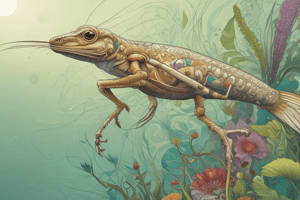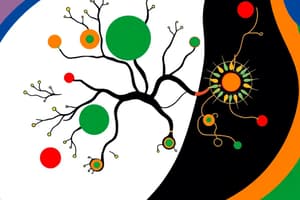Podcast
Questions and Answers
What is the primary mechanism by which evolution occurs?
What is the primary mechanism by which evolution occurs?
- Mutation rate
- Gene flow
- Genetic drift
- Natural selection (correct)
Which level of ecological organization includes both living and non-living components?
Which level of ecological organization includes both living and non-living components?
- Population
- Species
- Ecosystem (correct)
- Community
Why is biodiversity essential for ecosystem function?
Why is biodiversity essential for ecosystem function?
- It ensures the long-term survival of species. (correct)
- It promotes gene flow between species.
- It enhances resource availability.
- It eliminates the need for conservation efforts.
Which of the following techniques is a cornerstone of biotechnology?
Which of the following techniques is a cornerstone of biotechnology?
Which systems in the human body are involved in the transport of nutrients and gases?
Which systems in the human body are involved in the transport of nutrients and gases?
Which characteristic of life refers to the ability of an organism to maintain stable internal conditions?
Which characteristic of life refers to the ability of an organism to maintain stable internal conditions?
What is the primary function of carbohydrates in living organisms?
What is the primary function of carbohydrates in living organisms?
What distinguishes prokaryotic cells from eukaryotic cells?
What distinguishes prokaryotic cells from eukaryotic cells?
What process is primarily involved in the production of proteins in cells?
What process is primarily involved in the production of proteins in cells?
Which branch of biology focuses on the study of microorganisms?
Which branch of biology focuses on the study of microorganisms?
What role do lipids primarily serve in biological systems?
What role do lipids primarily serve in biological systems?
Which of the following is NOT a level of organization in biology?
Which of the following is NOT a level of organization in biology?
What is the function of genes in the context of genetics?
What is the function of genes in the context of genetics?
Flashcards
Gene Expression
Gene Expression
The process where a gene's information is used to make a functional product, like a protein.
Evolution
Evolution
Change in the inherited traits of a population over time. It's how life evolves!
Ecology
Ecology
The study of how organisms interact with their environment, including both living and non-living parts.
Biodiversity
Biodiversity
Signup and view all the flashcards
Biotechnology
Biotechnology
Signup and view all the flashcards
What is Biology?
What is Biology?
Signup and view all the flashcards
What is a cell?
What is a cell?
Signup and view all the flashcards
What are biological macromolecules?
What are biological macromolecules?
Signup and view all the flashcards
What is cellular respiration?
What is cellular respiration?
Signup and view all the flashcards
What is photosynthesis?
What is photosynthesis?
Signup and view all the flashcards
What is genetics?
What is genetics?
Signup and view all the flashcards
What is DNA?
What is DNA?
Signup and view all the flashcards
What are genes?
What are genes?
Signup and view all the flashcards
Study Notes
Introduction to Biology
- Biology is the scientific study of life and living organisms, encompassing a vast array of topics and disciplines.
- It investigates the structure, function, growth, origin, evolution, and distribution of living organisms.
- Biology explores various levels of organization, from molecules and cells to populations and ecosystems.
- Key branches of biology include botany (plants), zoology (animals), microbiology (microorganisms), genetics, and ecology.
Characteristics of Life
- All living organisms share fundamental characteristics, including:
- Organization: Composed of cells, the basic unit of life.
- Metabolism: Chemical reactions that convert energy and matter.
- Growth and development: Increase in size and complexity.
- Adaptation: Adjustment to environmental changes.
- Response to stimuli: Reaction to internal and external changes.
- Reproduction: Production of offspring.
- Homeostasis: Maintaining stable internal conditions.
- Heredity: Transmission of traits from one generation to the next.
Biological Macromolecules
- Biological molecules essential for life include carbohydrates, lipids, proteins, and nucleic acids.
- Carbohydrates: Provide energy and structural support. Examples include sugars and starches.
- Lipids: Store energy, form cell membranes, and act as hormones. Examples include fats and oils.
- Proteins: Perform diverse functions, including catalyzing reactions (enzymes), transporting substances, and providing structural support.
- Nucleic acids: Store and transmit genetic information (DNA and RNA).
Cell Structure and Function
- Cells are the fundamental units of life.
- Prokaryotic cells lack a nucleus and membrane-bound organelles.
- Eukaryotic cells possess a nucleus and membrane-bound organelles.
- Organelles within cells have specialized functions, including the nucleus, mitochondria, endoplasmic reticulum, and Golgi apparatus.
Cell Processes
- Cells carry out various processes, including:
- Cellular respiration: Extracts energy from food.
- Photosynthesis: Converts light energy into chemical energy.
- Protein synthesis: Production of proteins.
- Cell division: Reproduction of cells through mitosis and meiosis.
Genetics
- Genetics investigates heredity and the transmission of traits.
- DNA is the molecule that carries genetic information.
- Genes are segments of DNA that code for specific proteins.
- Gene expression: The process by which information from a gene is used to synthesize a functional gene product.
Evolution
- Evolution is the change in heritable characteristics of biological populations over successive generations.
- Natural selection is a key mechanism of evolution.
- Adaptations are traits that enhance survival and reproduction.
- Common ancestry: all life on Earth shares a common ancestor.
Ecology
- Ecology is the study of the interactions between organisms and their environment.
- Ecosystems include biotic (living) and abiotic (non-living) components.
- Populations, communities, and ecosystems are hierarchical levels of ecological organization.
- Key ecological concepts include energy flow, nutrient cycles, and biodiversity.
Biodiversity
- Biodiversity refers to the variety of life on Earth at all its levels, from genes to ecosystems.
- Biodiversity is essential for ecosystem function.
- Extinction is the complete disappearance of a species.
- Conservation efforts aim to protect biodiversity.
Biotechnology
- Biotechnology applies biological techniques to solve problems and create useful products.
- Genetic engineering is a powerful technique in biotechnology.
- Applications of biotechnology include medicine, agriculture, and industry.
Microbiology
- Microbiology encompasses the study of microorganisms.
- Microbes play a crucial role in ecosystems.
- Different types of microbes include bacteria, viruses, fungi, and protists.
Human Biology
- Human biology investigates the anatomy, physiology, and health of humans.
- Systems in the human body include the nervous system, circulatory system, digestive system, and respiratory system.
- Understanding human biology is critical for disease prevention and treatment.
Studying That Suits You
Use AI to generate personalized quizzes and flashcards to suit your learning preferences.




